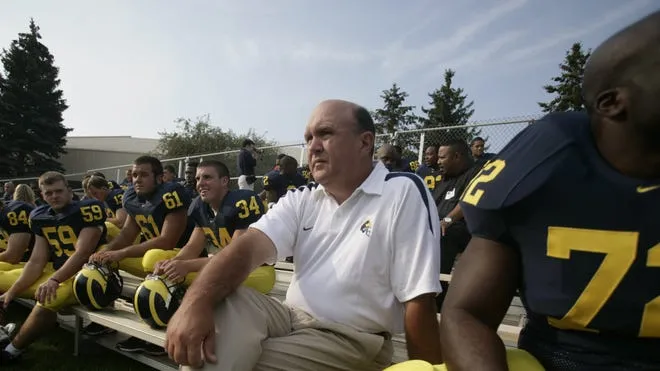A Fond Farewell to a Coaching Legend
The world of college football lost a significant figure this week with the passing of Mike DeBord, former offensive coordinator for the University of Michigan and head coach for Central Michigan University. At the age of 69, DeBord’s death has left a profound impact on the football community, evoking memories of a career that spanned decades and touched the lives of countless players and coaches.
Early Life and Career
Born in 1954 in Michigan, DeBord showcased a passion for football from a young age. He played quarterback at the University of Michigan in the early 1970s, where he laid the groundwork for what would become a storied career in coaching. He graduated in 1976 and immediately joined the coaching ranks, starting as a graduate assistant under the legendary Bo Schembechler.
Rise Through the Ranks
DeBord quickly made a name for himself with his sharp football mind and ability to develop young talent. After his stint at Michigan, he went on to various coaching positions across the nation, including pivotal roles at schools like Oregon, Eastern Michigan, and Central Michigan. His work with the Chippewas ultimately led to a head coaching position in 2000. DeBord’s tenure at Central Michigan lasted until 2002, laying the foundation for future success under succeeding coaches.
Return to Michigan
In 2008, DeBord returned to his roots, rejoining the Michigan Wolverines as the offensive coordinator. His experience and strategic insights into the game played a crucial role during his time there. He focused on utilizing players to their strengths and adjusting game plans to match the opposing team’s weaknesses, helping to transition the team during a challenging period in Michigan football history.
A Lasting Influence
Beyond the statistics and wins, what truly defined DeBord was his genuine concern for the well-being of his players. Many former Wolverines have spoken of the personal touch he brought to the program, emphasizing that he saw them not just as athletes, but as young men with dreams and aspirations. His dedication, mentorship, and guidance helped shape the lives and careers of numerous players.
DeBord’s coaching style often prioritized balance in offensive play calling. He emphasized the importance of both the running game and the passing game, believing that a well-rounded offense was key to success. This philosophy not only garnered favorable results on the field but also equipped young athletes with vital skills for life beyond football.
Praise from Peers
The news of DeBord’s passing has prompted an outpouring of tributes from former players, coaches, and peers within the football community. Coach Jim Harbaugh, who has been vocal about the influence that DeBord had on his career, described him as “an exceptional football mind.” Harbaugh stated, “Mike DeBord was a mentor to many and his contributions to Michigan football will never be forgotten. His dedication to the game and to his players continues to inspire coaches and athletes alike.”
Impact on Player Development
At the heart of DeBord’s coaching philosophy was a commitment to player development that extended beyond the confines of the football field. He firmly believed in instilling core values such as discipline, hard work, and teamwork. Many of his former players have noted how they have carried these lessons into their personal and professional lives, attributing much of their success to the foundation built during their time under his tutelage.
Legacy Beyond Michigan
While Michigan remains a significant part of DeBord’s legacy, his influence reached beyond the confines of Ann Arbor. His work at Tennessee as an assistant coach guided a new generation of athletes and solidified his reputation as a sought-after offensive strategist. There, he rejuvenated interest in programs, breathing new life into the offensive schemes that helped elevate the teams he coached.
Personal Life
Outside of the gridiron, Mike DeBord was a devoted family man. He is survived by his wife and children, who meant the world to him. Friends remember him as a kind-hearted individual, always willing to offer guidance and support to those around him. The football community will miss his presence both on and off the field.
Conclusion
The loss of Mike DeBord is not just a tragedy for the Michigan football community but for the entire college football landscape. His contributions have left an indelible mark, shaping the lives of student-athletes and inspiring generations of coaches. As we remember Mike DeBord, we celebrate not only the achievements on the field but the human connections and life lessons that define what true success should be in the world of sports.







